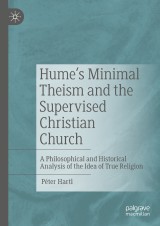Details
Hume's Minimal Theism and the Supervised Christian Church
A Philosophical and Historical Analysis of the Idea of True Religion|
106,99 € |
|
| Verlag: | Palgrave Macmillan |
| Format: | |
| Veröffentl.: | 05.06.2024 |
| ISBN/EAN: | 9783031549458 |
| Sprache: | englisch |
Dieses eBook enthält ein Wasserzeichen.
Beschreibungen
<p>In this book, Péter Hartl offers a novel and comprehensive interpretation of David Hume’s philosophy of religion focusing on various notions of ‘true religion’ in Hume’s overall philosophy and how these ideas relate to various early modern positions on religion, society and philosophy. The account consists of both critical and positive parts of Hume’s overall, nuanced position on theoretical, social and political aspects of religion and the philosophical criticism of religion. Hartl criticises the atheist and completely negative readings of Hume’s philosophy of religion. Instead of presenting Hume’s position as either a radical secularist or closet atheist, Hartl’s interpretation builds on the underdeveloped, positive and constructive parts of Hume’s account of (true) religion. For Hume, on the one hand, true religion is compatible with or even vindicates minimal theism, and it forms part of philosophy exemplifying intellectual virtues. On the other hand, Hume has a pragmatic stance on the role of religion in society, according to which the government should control religious institutions to reduce the power of church authorities but to retain some positive social effects of religion.</p>
<div><div>1: Introduction.- 2: Negative readings of ‘true religion’: some general problems with interpretation.- 3: Against negative readings of ‘true religion’.- 4: Anthropomorphism and priestly power: Hume’s criticism of popular religion.- 5: Hume against Christian natural theology and analogical reasoning on God.- 6: True religion as true philosophy: its intellectual, emotional and moral aspects.- 7: Reformed popular religion: a supervised state church and religious fictionalism.- 8: Summary.</div></div><div><br></div>
<p><b>Péter Hartl</b> (PhD, University of Aberdeen) was a research fellow at the Institute of Philosophy, Research Centre for the Humanities, Budapest (formerly known as the Hungarian Academy of Sciences). Until 2022, he was a member of the MTA-Lendület Morals and Values Research Group. He has published works on epistemology, the philosophy of Michael Polanyi and that of David Hume, including two papers on Hume’s philosophy of religion, <i>Hume and the art of theological lying</i> (Journal of Scottish Philosophy), and <i>Hume on the rational and irrational origins of religion </i>(Hume Studies). In addition to co-editing <i>The Value of Truth</i> special issue of <i>Synthese</i> and the volume entitled Science, Freedom, Democracy (<i>Routledge</i>, 2021), Hartl also edited <i>Science, Faith, Society: new essays on the philosophy of Michael Polanyi </i>(<i>Springer</i>, 2024)<i>.</i></p><div><div><div> </div> </div> </div>
<div><div>In this book, Péter Hartl offers a novel and comprehensive interpretation of David Hume’s philosophy of religion focusing on various notions of ‘true religion’ in Hume’s overall philosophy and how these ideas relate to various early modern positions on religion, society and philosophy. The account consists of both critical and positive parts of Hume’s overall, nuanced position on theoretical, social and political aspects of religion and the philosophical criticism of religion. Hartl criticises the atheist and completely negative readings of Hume’s philosophy of religion. Instead of presenting Hume’s position as either a radical secularist or closet atheist, Hartl’s interpretation builds on the underdeveloped, positive and constructive parts of Hume’s account of (true) religion. For Hume, on the one hand, true religion is compatible with or even vindicates minimal theism, and it forms part of philosophy exemplifying intellectual virtues. On the other hand, Hume has a pragmatic stance on the role of religion in society, according to which the government should control religious institutions to reduce the power of church authorities but to retain some positive social effects of religion.</div><b><div><b><br></b></div></b><b>Péter Hartl</b> (PhD, University of Aberdeen) was a research fellow at the Institute of Philosophy, Research Centre for the Humanities, Budapest (formerly known as the Hungarian Academy of Sciences). Until 2022, he was a member of the MTA-Lendület Morals and Values Research Group. He has published works on epistemology, the philosophy of Michael Polanyi and that of David Hume, including two papers on Hume’s philosophy of religion, <i>Hume and the art of theological lying</i> (Journal of Scottish Philosophy), and <i>Hume on the rational and irrational origins of religion </i>(Hume Studies). In addition to co-editing <i>The Value of Truth</i> special issue of <i>Synthese</i> and the volume entitled Science, Freedom, Democracy (<i>Routledge</i>, 2021), Hartl also edited <i>Science, Faith, Society: new essays on the philosophy of Michael Polanyi </i>(<i>Springer</i>, 2024)<i>.</i><br></div>
Interprets Positive and constructive parts of Hume’s account of (true) religion Discusses Hume’s overall, nuanced position on theoretical, social and political aspects of religion Focuses on various notions of ‘true religion’
“Peter Hartl’s book on Hume’s <i>Minimal Theism</i> breaks important new ground in the interpretation of David Hume’s writings on God and religion. Hartl navigates the challenging waters of Hume’s genuine theism and true religion, and he constructs a thoughtful, logical reading of Hume on these important topics. Hartl defends a positive reading of Hume on God, landing on what he calls Hume’s “minimal theism”. Hartl is at his best in uncovering the problems of various negative readings and in defending his own interpretation. Serious readers of David Hume’s <i>Dialogues</i> and the <i>Natural History of Religion</i> will find in Peter Hartl’s work clear guidance for interpreting the twists and turns of these philosophical classics.”<p><b>—</b><b>Timothy S. Yoder, </b>Dallas Theological Seminary, USA, Author of, <i>Hume on God: Irony, Deism and Genuine Theism</i></p>
Diese Produkte könnten Sie auch interessieren:

Philosophy and Religion in German Idealism

von: William Desmond, Ernst-Otto Onnasch, Paul Cruysberghs

96,29 €
















